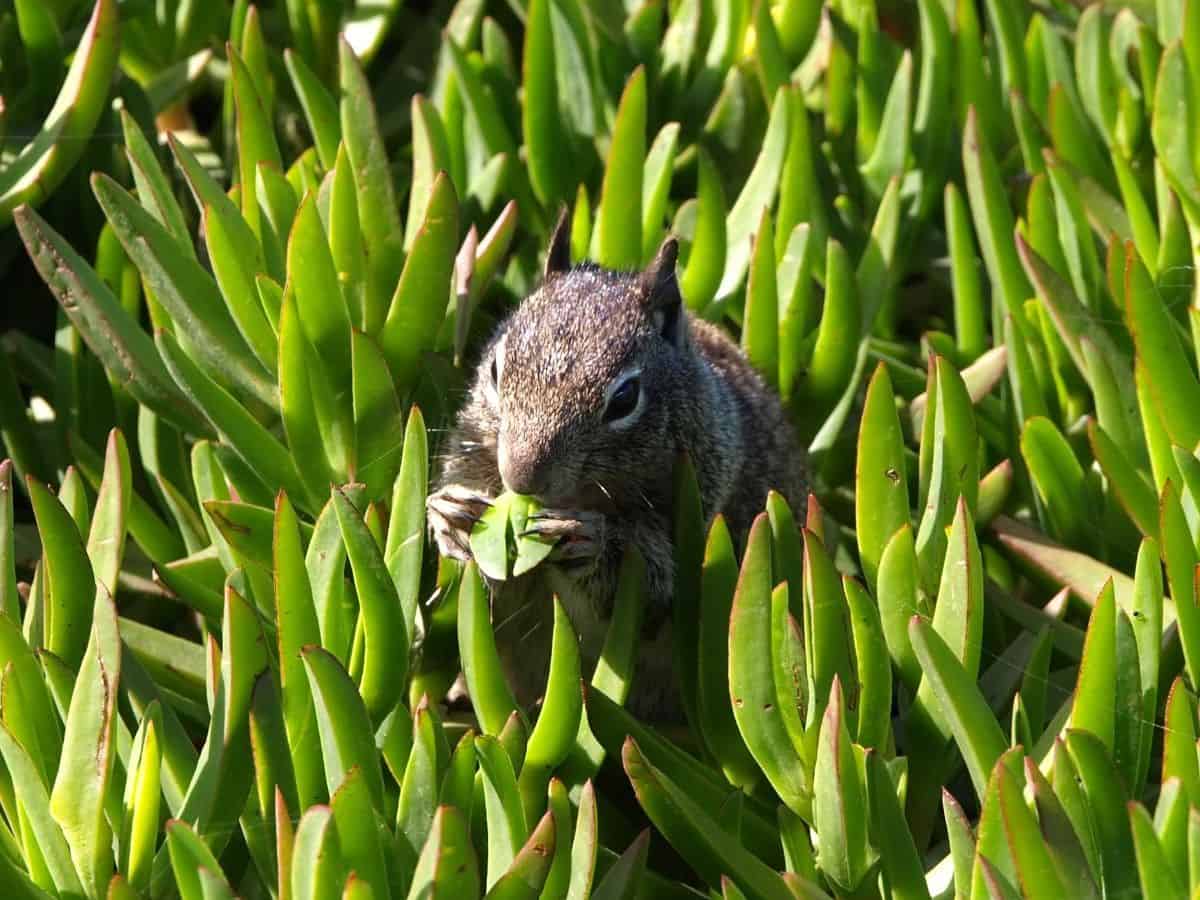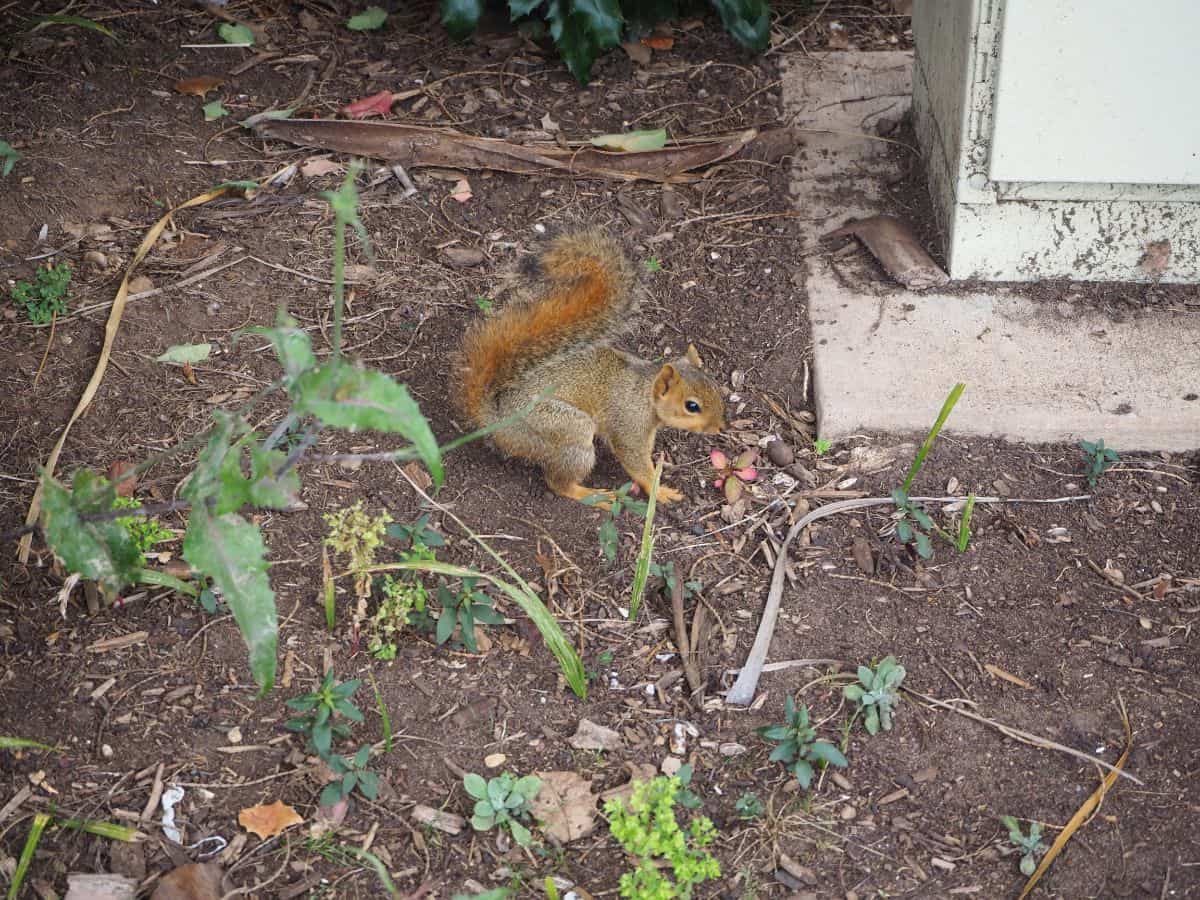
One of the most persistent pests a gardener can encounter are squirrels. These tenacious critters may be cute, but they are known for climbing, digging, and chewing their way through almost anything to reach food.
Although there is no miracle product to keep squirrels away from your beloved plants, there are plenty of options to suit the individual needs of your property.
Jump to:
The Squirrel Life Cycle

There are over 200 species of squirrel divided into three categories: tree squirrels, ground squirrels, and flying squirrels. They’re found all over the world, except for Australia and Antarctica, so if you think you have a squirrel problem, just remember that you’re not alone.
Squirrels are prolific breeders. They usually have two litters per year, in late winter and midsummer. Each litter has an average of two to four babies, but they can have up to eight. The babies are weaned at the age of two months and reach adulthood by nine months when they can start having families of their own.
Although it’s possible for squirrels to live up to 15 years in the wild, due to heavy predation they have an average lifespan of 5-6 years. Predators are the single largest threat to adolescent squirrels.
Squirrels are primarily herbivores and eat up to a pound of food per week, so the damage to your garden can quickly add up. In addition to their weekly food intake, they collect and bury extra food to store through the winter.
Read Related Articles:
Signs of Infestation
If you have a squirrel problem, you’ll know it. Squirrels are notorious for chewing and digging their way through gardens and yards. If your garden has been ravaged by these furry fiends you’ll find chewed up leaves, uprooted plants, and holes filled with their favorite foods.
Squirrel damage on succulents is usually easy to recognize. Unlike most of the insect pests, squirrels can take big chunks out of plants. Look for jagged tear marks and deep wounds in succulent leaves and cacti.
Squirrels usually don't take more than a few bites from your succulents... so the evidence will stick around!
How to Prevent Squirrels on Succulents

As the old saying goes, an ounce of prevention is worth a pound of cure. Keeping the squirrels out of your garden before they discover the treasure trove of snacks is much easier than trying to convince them to move on.
Read Also: How to Revive a Dying Succulent
Repellents
No products found.
Repellents are an excellent way to discourage squirrels from visiting your garden.
Peppermint is a natural alternative to using harsh chemicals around your plants. Many gardeners have found success planting peppermint alongside their succulents, while others have kept the pests at bay by soaking cotton balls in peppermint oil and sprinkling them throughout the garden.
Mothballs are another repellent used frequently by desperate gardeners. Squirrels detest the smell of mothballs so placing them around the boundaries of your garden is often enough to encourage them to search for food elsewhere.
However, mothballs can be toxic to squirrels and other wildlife, so it’s important to be aware of the impact this method may have on your community. Placing mothballs in nylon stockings before securing them around your garden can help, but it is still possible for wildlife to consume them.
Squirrels aren’t exactly fans of spicy food, so spraying your garden with a store-bought or homemade pepper spray can discourage them from snacking on your landscaping.
If you’re a do-it-yourselfer, you can make your own repellent by boiling a few jalapenos and a bit of garlic or onion in about a quart of water. After cooling, strain out the solids, pour into a spray bottle, and spritz your plants with your spicy mixture.
You can also sprinkle dried spices, such as cayenne or red pepper flakes, throughout your garden to discourage digging and chewing.
When using these repellents, remember to reapply periodically, especially after rainfall or heavy watering.
Read Related Topic: How to Treat Scale on your Succulents and Cacti
Netting and Fencing

Depending on the landscape of your garden or yard, one of the most successful methods of keeping squirrels out is to simply build a barrier that they cannot cross.
This is easier said than done since squirrels are well-known for their acrobatic talent. Covering your garden with a chew-proof mesh material allows sunlight, water, and fresh air to reach your plants, but not hungry critters. Unfortunately, netting may not be the most attractive decoration for your garden, but it will keep your plants safe and sound.
Squirrel-proof fencing is another method to protect your garden. Plastic or PVC fencing is considered the most effective since its slick surface prevents the squirrels from climbing. Squirrels are excellent climbers so it’s often necessary to add netting to your fence to keep them out.
If you choose to rely on fencing, be aware of any trees around your garden. If they can’t climb your fence, they may be able to climb a nearby tree and leap right over. Squirrels are also efficient diggers so make sure the fencing extends below the surface of the ground a few inches to ensure that they can’t get dig their way under your barrier.
Routinely checking your fencing for holes and damage will ensure your garden remains a squirrel-free zone.
Electronic Devices
For the technologically-inclined gardener, a variety of ultrasonic repellent devices are available. These devices are usually placed in or on the ground or hung in the desired area. Solar models are also available if your garden area is lacking in electric outlets.
These devices can also help keep moles, birds, and stray pets from digging up your succulents and cacti. Some models even include motion-activated strobe lights to further discourage animals from destroying your landscaping.
Treatments for Squirrels
Predators
Predators are the biggest natural threat to squirrels, so exploiting this fear is one of the simplest tactics to encourage them to scavenge elsewhere. Both dogs and cats love chasing squirrels, so if you’re willing to share your home with a furry companion they may return the favor by keeping the squirrels out of your yard. Even when they aren’t on active patrol, the scent of pet urine is often enough to remind squirrels that they aren’t welcome.
If the life of a pet owner doesn’t suit you, you can always buy predator’s urine. It may sound strange but spraying your yard with wild animal urine is a proven technique to keep squirrels out. Your local garden center or outdoor equipment store will likely have a variety of options including fox, coyote, wolf, and bobcat. Take your pick and you may find that the squirrels have lost interest in your garden.
Squirrel Feeders
If you prefer a more passive solution to your squirrel problem, you can always provide the hungry critters with a free meal and hope they leave your precious plants alone. Some gardeners with large lots have found success in setting up squirrel feeders in various locations on their property.
The theory here is that a satisfied squirrel will be more likely to leave your plants alone. If you can set up the feeders away from your garden you may find that the squirrels prefer an easy meal, especially if you combine this method with a few deterrents around your garden.
Pest Control
Squirrels usually make their homes in the holes and hollows of trees, but you may find that the squirrels raiding your garden have cozied up inside the walls, attic, or crawl space of your home. In this case, it may be necessary to call your local pest control company to safely and humanely remove them. Their chewing and nesting habits can cause significant damage to your home over time, so it’s best to have them removed as soon as possible.
Combining a few of these methods may be the best way to keep squirrels out of your succulents, but it’s important to be as determined to keep them out as they are to get in.



maddy learman
Will the peppers hurt my succulents?? My plants get very sick very easily and I was wondering if the pepper water would hurt or kill my succulents.
Patrick Grubbs
Nope, they'll be fine unless it was some extreme concentration.
Colleen McHugh
Thanks so much Patrick! You've given me a lot of information about squirrels so I can make my decisions based on your many options.
Patrick Grubbs
Glad to have helped!
Vanessa
I have finally found something that is actually working and am so excited to share! Here in Texas the squirrels have taken over! They are ruthless and do not have any respect for my beloved succulents! I had tried everything to get rid of them but poison because I do not care to kill them but I push has come to shove and I am willing to let them poke themselves! I have planted prickly cactuses randomly around my succulents and they have seemed to get the point! My plants were getting attacked several times a day to NOT AT ALL :D! I am so glad and hope this helps other save their loved succulents☺
Patrick Grubbs
Hahaha, way to go Vanessa! Don't let those pesky rodents push you around! I'm glad that scattering cacti around has dissuaded them, succulents as a solution is something I can get behind!
TJ
Nice Tips, thanks for the info..:)
AJ
Great info! We recently moved to St. George, UT. and we have planted a good-sized back garden including several wall-hanging succulents that have been doing great until lately. Suddenly they began to disappear. Big mystery until this am. We went out at oh-dark-thirty to enjoy the sunrise and caught two little chipmunks heads-down in the succulents! I’m gonna try the cool remedies posted here. Is there one that you think would work better for chipmunks - as opposed to squirrels-or is it all the same? again, thanks!
Patrick Grubbs
Squirrel and chipmunk remedies are about the same. One time I caught a chipmunk in a pickle jar, but I wouldn't recommend that method.